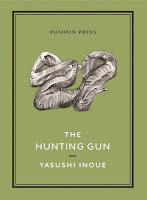Author: Yasushi Inoue (author). Michael Emmerich (translator)
Publication Information: Pushkin Collection. 1949 (original Japanese), 2014 (translation). 112 pages.
ISBN: 1782270019 / 978-1782270010
Book Source: I read this book as a selection for a local book club.
Opening Sentence: "I published a poem titled 'The Hunting Gun' in the most recent issue of The Hunter's Friend, a floppy little magazine put out by the Japan Hunters' Club."
Favorite Quote: "We humans are, in the end, stupid creatures who cannot help desiring that someone know us as we are."
This book is a tragedy in three letters. The book truly only has four characters - Misugi Josuke and three women whose lives he touches. Shoko is the young woman to whom he has been "uncle" until she discovers the truth about his role in her life. Midori is his wife. Saiko is his love, lover, paramour, mistress - the name depends on your perspective.
There is a narrator in the background. That narrator is the author of a poem titled The Hunting Gun, which serves as introduction to Misuse Josuke. The narrator, however, is somewhat immaterial other than being the vehicle by which the letters find light of day. I am still puzzled by the presence of the narrator and the poem and the hunting reference. I suppose it may serve to characterize Misugi Josuke, or it may speak to the random connections of life. The discussion of the symbolism makes a great topic for an English class or a book club!
The letters are all addressed to Misugi Josuke and come from each of the three women. Put together, they paint a picture of infidelity and a longtime love affair. Shoko learns of the affair when she reads her mother's diary. Midori has always known and looked away. Saiko left her own husband and had chosen this life of illicit love and chosen this environment in which to raise her daughter.
This book is unusual given the combination of its original publication date of 1949 and its Japanese setting and origin. This time period, of course, is within a few years of the end of World War II. Yet, that history has no place in this book. This is an intensely emotional and personal story of a relationship and the far reaching, life altering impact that relationship has on these four individuals.
The book is brief - a novella. Yet, the content is so serious and tragic that the book feels weighty. The book also proves somewhat frustrating because the letters truly do not explain the "why". Shoko's letter is the only one that has no why because she is not part of the triangle of this relationships. Why does the affair happen? Why does it last? Why does the marriage last? More so than Misugi Josuke, why do the women make the choices they do?
Perhaps, given the time and place, women stay. Yet, the question remains unanswered.
For these reasons, this book makes for a great book club discussion. It also examples one of the reasons I love being in a book club. We are a diverse group, and each month we take turns picking the book. Without the book club, I don't think I would have discovered and read this book or even been introduced to this author. I love that the book club takes me in undiscovered directions!
Please share your thoughts and leave a comment. I would love to "talk" to you.

No comments:
Post a Comment